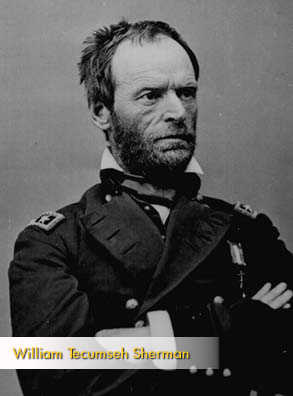
The Union general who burned Atlanta is credited with saying that "war is cruelty. There is no use trying to reform it. The crueller it is, the sooner it will be over." He also commented ruefully: "if I had my choice I would kill every reporter in the world, but I am sure we would be getting reports from Hell before breakfast."
Right wingers are currently going bananas over a speech by Molly Bingham, an experienced US photo journalist who has documented the Iraqi insurgency. A mild example of this foolishness from someone who styles himself "Macho Nachos:" "By the way, do you have any duct tape handy? I think my head exploded after reading her article and I need to piece it back together."
Good luck buddy -- your head must be pretty badly shattered if you can't live with this from Bingham; she and her colleagues
"thought it was really journalistically important to understand who it was who was resisting the presence of the foreign troops. If you didn't understand that, how could you report what was clearly becoming an 'ongoing conflict?' And if you were reading the news in America, or Europe, how could you understand the full context of what was unfolding if what motivates the 'other side' of the conflict is not understood, or even discussed?"
The five lessons she drew from her work are worth listing here.
- Lesson One: Many journalists in Iraq could not, or would not, check their nationality or their own perspective at the door.
- Lesson Two: Our behavior as journalists has taught us very little. Just as in the lead up to the war in Iraq, questioning our government's decisions and claims and what it seeks to achieve is criticized as unpatriotic.
- Lesson Three: To seek to understand and represent to an American audience the reasons behind the Iraqi opposition is practically treasonous.
- Lesson Four: The gatekeepers -- by which I mean the editors, publishers and business sides of the media -- don't want their paper or their outlet to reveal that compelling narrative of why anyone would oppose the presence of American troops on their soil.
- Lesson Five: What it's like to be afraid of your own country? . . . How many times was the risk that our own government might come in and rifle through our apartment, our homes or take us away for questioning in front of our children a factor in our decision not to do a story? How many times did we as journalists decide not to do a story because we thought it might get us into trouble?
Bingham is unusually protected in her profession. Her family were the long time owners of the Louisville Courier-Journal (now a Gannet property). It shouldn't take such privilege to allow reporting that strays off the beaten path. She seems to have used her opportunities well, creating a respected body of work from places as far flung as Burundi, Rwanda, Sierra Leone and Gaza, as well as shooting some of the most immediate pictures of the burning Pentagon on September 11.
Robert Fisk, the London Independent's Middle East correspondent, was so impressed by the vituperation that inquisitive reporting sets off in this country that he toured the US in 2003 giving a talk entitled: "September 11 -- Ask Who Did It, But For Heaven's Sake Don't Ask Why." In a later speech at Cambridge University, the actor John Malkovich, a professional portrayer of aloof villains, offered, absurdly, to kill Fisk. How's that for a reasoned response to unpleasant information?
Critics of reporting do seem easily unhinged by efforts to find and report gritty, undomesticated realities. Realists like General Sherman are out of style.
No comments:
Post a Comment